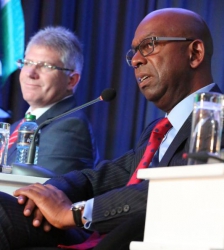
Kenya’s mobile service provider, Safaricom, clinched yet another profitability record after it declared a 23 per cent growth in net earnings in the six months to September. The firm made Sh18.1 billion compared to Sh14.7 billion registered the previous period.
The record earnings were supported by strong growth in data, messaging and mobile money services.
The financial results released showed that revenues rose 12 per cent to Sh84.9 billion driven by a 24 per cent surge in non-voice income such as data and M-Pesa and a four per cent growth in voice revenue.
Voice revenues earned Sh45.2 billion, while M-Pesa revenues amounted to Sh19.4 billion and messaging revenues stood at Sh8 billion.
For the first time in its 15-year history, the firm’s earnings from non-voice services look set to surpass earnings from voice as Kenyans’ uptake of mobile money and smart phones help boost sales.
“Our non-voice revenue is driven by a growth in the number of active customers, usage of M-Pesa and data services and an uptake of smartphones,” explained Safaricom CEO Bob Collymore when briefing the press yesterday.
Collymore attributed the improved performance to a restructuring in its business by creating units dedicated to different units of the country.
This contributed to the growth of its customer numbers.
Safaricom’s shares at the Nairobi Securities Exchange rose by three per cent on the news of the results trading at a two-week high of Sh15.05, with some nine million shares changing hands at the time of going to press.
The writing has long been on the wall for Kenya’s mobile phone operators as users turn to free messaging and calling apps like WhatsApp and Viber, presenting a challenge for voice revenue.
In the 2008 financial year, when Safaricom launched M-Pesa service, the company reported a revenue haul of Sh59.2 billion, with earnings from data making up eight per cent of this figure.
Two years later, revenue from data and M-Pesa made up 20 per cent of the company’s Sh79 billion total revenue haul as the share of voice revenue shrunk to 80 per cent.
Safaricom’s capital spend and marketing strategy is slanted towards strengthening its data and mobile money infrastructure and the company is set to enjoy a comfortable lead in this market segment going forward.
In the first-half of the 2015/2016 fiscal year, the firm has rolled out 833 new 3G sites vis a vis 236 2G sites and rolled out an additional 379 4G sites, with 4G now covering 14 counties.
The firm’s fibre network now stands at 2,328km spread throughout 10 towns with the network expending to Ethiopia. Safaricom’s free cash flow decreased by 38.5 per cent to Shs9.5 billion on account of early capital spend on the National Police Security Network, which the firm states is on course for deployment in a few weeks’ time.
In addition to this, the firm further reported a Sh690 million loss on account of exchange rate shocks in the period under review.
M-Shwari, the firm’s micro-lending service saw active users rise to 7.1 million with deposits mounting to Sh6.9 billion and Sh5 billion in loans disbursed.
 The Standard Group Plc is a multi-media organization with investments in media
platforms spanning newspaper print operations, television, radio broadcasting,
digital and online services. The Standard Group is recognized as a leading
multi-media house in Kenya with a key influence in matters of national and
international interest.
The Standard Group Plc is a multi-media organization with investments in media
platforms spanning newspaper print operations, television, radio broadcasting,
digital and online services. The Standard Group is recognized as a leading
multi-media house in Kenya with a key influence in matters of national and
international interest.
 The Standard Group Plc is a multi-media organization with investments in media
platforms spanning newspaper print operations, television, radio broadcasting,
digital and online services. The Standard Group is recognized as a leading
multi-media house in Kenya with a key influence in matters of national and
international interest.
The Standard Group Plc is a multi-media organization with investments in media
platforms spanning newspaper print operations, television, radio broadcasting,
digital and online services. The Standard Group is recognized as a leading
multi-media house in Kenya with a key influence in matters of national and
international interest.










